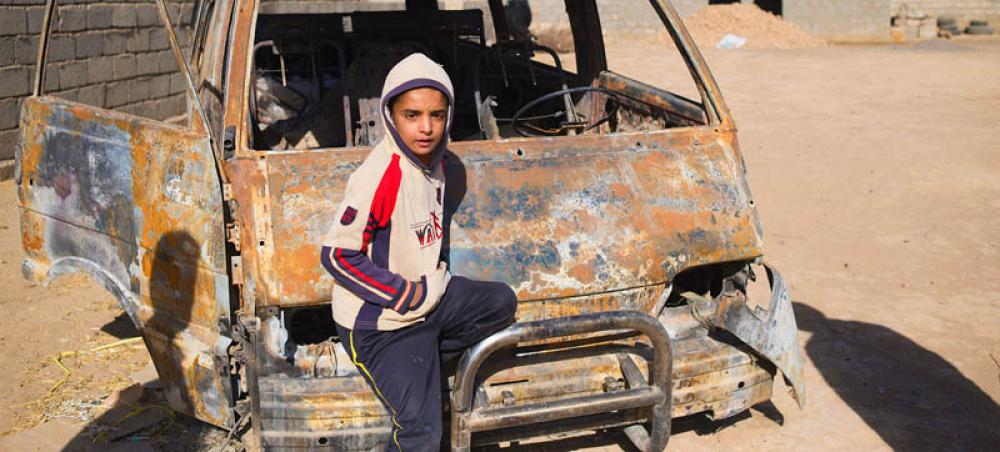Just Earth News | @justearthnews | 12 Feb 2021, 02:27 am Print
 ISIL
ISIL Image: UNICEF/Lindsay Mackenzie
New York: The threat to international peace and security posed by ISIL terrorist fighters is “on the rise again”, the UN counter-terrorism chief told the Security Council on Wednesday.
Despite the competing priorities brought by the COVID-19 pandemic, Vladimir Voronkov, head of the UN Office of Counter-Terrorism (UNOCT), said that it was “crucial” for Member States to remain focused and united in thwarting terrorism.
“While ISIL has not developed a purposeful strategy to exploit the pandemic, its efforts to regroup and to reinvigorate its activities [has] gained further momentum”, he said.
Via videoconference, the UN official flagged that the terrorists, also known in Arabic as Da’esh, have maintained the ability to move and operate, including across porous borders.
At the same time, the pandemic’s socio-economic toll and political fallout could further render individuals receptive to radicalization and recruitment.
‘Long-term and global threat’
As the international community continues to grapple with the legacies of the group’s so-called “caliphate”, the UNOCT chief said that some 10,000 ISIL fighters, mostly in Iraq, are pursuing a protracted insurgency, posing “a major, long-term and global threat”.
“They are organized in small cells hiding in desert and rural areas and moving across the border between the two countries, waging attacks”, he elaborated.
Al-Hol conundrum
Mr. Voronkov also spoke of the precarious situation of the mostly women and children with links to the fighters, zeroing in on the dire humanitarian and security situation in detention facilities and displacement camps, “especially in Al-Hol”.
“Nearly two years after the territorial defeat of ISIL, some 27,500 foreign children are still in harm’s way in the camps in northeast Syria, including about 8,000 children from some 60 countries other than Iraq”, he said, adding that 90 per cent are under 12.
Based on humanitarian urgency, moral imperative and legal obligations the UN official echoed the Secretary-General’s call to Member States to “voluntary repatriate adults and children stranded in Iraq and Syria”.
Spotlighting two continents
The UNOCT Head briefed the Ambassadors on ISIL’s activities in West Africa, Asia and South-East Asia, recalling two suicide bombings conducted by women in the Philippines last August.
10,000 ISIL fighters, mostly in Iraq, are pursuing a protracted insurgency -- UNOCT chief
And he updated on his office’s activities, including the launch of a Global Programme on Prosecution, Rehabilitation and Reintegration – in close cooperation with the Counter-Terrorism Committee Executive Directorate (CTED) and the UN Office on Drugs and Crim (UNODC) – to assist Indonesia, Burkina Faso and Lake Chad Basin States, with Mozambique support on standby, if requested.
‘Scourge of terrorism’
Noting that 2021 is a the 20th anniversary of resolution 1373, which the Security Council adopted on countering terrorism in the wake of the 9/11 attacks in the US, Mr. Voronkov urged Member States to recommit themselves under UN auspices to “multilateral action against terrorism”.
He underscored the need to end the “scourge of terrorism” by defeating ISIL in cyberspace, disrupting new attacks globally and tackling the threat posed by it regional affiliates, especially in Africa.
“And we must urgently solve the protracted issue of ISIL members…lest our failure enables the group’s resurgence”, he said, assuring that through the Global Counter-Terrorism Coordination Compact, the UN system will continue to “stand by Member States as they rise to these challenges”.
COVID: ‘Most urgent challenge’
UN Counter-Terrorism Committee Executive Director (CTED) Head Michèle Coninsx updated on the Secretary-General’s 12th strategic-level report along with the UN’s work in addressing ISIL during the COVID-19 pandemic.
She pointed to the current “volatile and complex” security environment, which she maintained is highlighted by “generational challenges” from terror groups.
“The COVID-19 pandemic is the most urgent challenge”, Ms. Coninsx said, noting that it has accelerated many underlying issues that are fueling various threats and “leaving us in a precarious situation”.
Among other things, it has diverted attention and resources away from combatting the spread of violence and extremism by terror groups and created obstacles for Member States to repatriate their nationals from Syria and Iraq.
The UN remains “deeply concerned at the dire situation” faced by mostly women and children in camps that have no access to medicine, hygiene or shelter, which has been exacerbated by the pandemic’s restrictions on humanitarian aid, she said.
resolutions, Ms. Coninsx enumerated some of CTED’s efforts to improve cooperation and capacity among States, largely through online platforms during the pandemic.
Stay focused on terrorism
CTED plans to conduct a “hybrid follow-up assessment” visit to Iraq and neighbouring countries to identify challenges that need to be addressed, Ms. Coninsx informed ambassadors and highlighted the Directorate’s efforts to strengthen community-based treatment for returning foreign terrorist fighters and their families in Asian States.
She also pointed to “deep dive” efforts to assist States in areas such as border control and firearms management while reiterating commitment to the “one UN approach” in countering terrorism and its financing.
- IDF strikes Hezbollah targets in Lebanon after projectile fire toward Northern Israel; 31 killed
- Pakistan: Armed gunmen kidnap 14 workers during coordinated raids in Balochistan
- ISIS-inspired plot foiled in UK: Two men get life sentences for targeting Jewish community
- India rejects allegations, urges Pakistan to tackle its ‘home-grown ills’
- Massacre in Islamabad: ISIS takes responsibility for deadly Pakistan blast





-1763561110.jpg)
